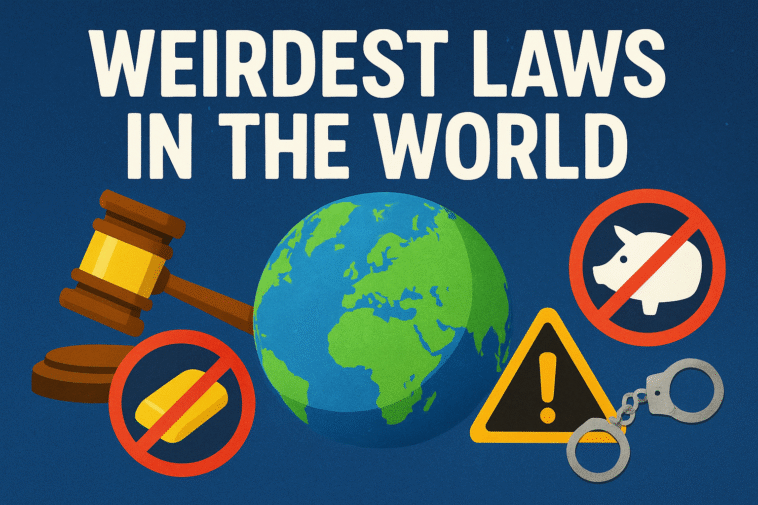 Weirdest Laws in the World: Strange Rules That Actually Exist
Weirdest Laws in the World: Strange Rules That Actually Exist
When we think of laws, we usually imagine rules that maintain order, justice, and fairness. But the world is a strange place—and so are some of the laws that exist within it. Across history and cultures, people have created rules that are not just unusual but downright bizarre. From banning chewing gum to making it illegal to own just one guinea pig, these laws reveal the quirks, fears, and cultural oddities of different nations. So fasten your seatbelt 
 Why Do Strange Laws Exist?
Why Do Strange Laws Exist?
Before diving into our list, let’s pause for a moment. Why would governments even bother passing such unusual laws? Here are some common reasons:
-
Cultural traditions: What seems weird in one culture is perfectly normal in another.
-
Historical context: Some laws made sense centuries ago but still remain on the books today.
-
Public order & safety: Odd-sounding rules are often attempts to prevent chaos.
-
Over-regulation: Sometimes lawmakers go too far in trying to control behavior.
With that in mind, let’s explore some of the strangest laws from around the globe.
 The Weirdest Laws in the World
The Weirdest Laws in the World
1.  No Chewing Gum in Singapore
No Chewing Gum in Singapore
Singapore is famous for its cleanliness, but did you know chewing gum is banned there? Since 1992, bringing or selling chewing gum has been illegal (with some exceptions like medical gum). The law was introduced to prevent sticky messes on streets, benches, and public transport. If you’re caught importing gum, you can face hefty fines of thousands of dollars.
2.  Switzerland’s “Lonely Guinea Pig” Law
Switzerland’s “Lonely Guinea Pig” Law
In Switzerland, it’s considered animal cruelty to own just one guinea pig. Why? Because guinea pigs are social creatures and get lonely. If you want one, you must get them in pairs or more. Interestingly, Switzerland even has a “rental service” for guinea pigs if one of yours passes away!
3.  Don’t Play Just One Song in North Korea
Don’t Play Just One Song in North Korea
In North Korea, the government controls not just politics but also music. Citizens are only allowed to listen to state-approved songs. Playing music from the West or even a non-approved local tune can land you in serious trouble—or worse.
4.  No Dogs in Iceland?
No Dogs in Iceland?
Believe it or not, Reykjavik, Iceland, banned dogs as pets for decades (from the 1920s until the 1980s). The fear was that dogs spread diseases. While the law has now been lifted, dog ownership is still heavily restricted compared to other countries.
5.  Don’t Walk with Ice Cream in Oklahoma, USA
Don’t Walk with Ice Cream in Oklahoma, USA
In Oklahoma, it’s illegal to walk backwards with an ice cream cone in your back pocket. Sounds ridiculous? It is. The law reportedly dates back to horse thieves—who used to put ice cream cones in their pockets to lure horses away without technically “stealing” them.
6.  Flush or Pay a Fine in Singapore
Flush or Pay a Fine in Singapore
Singapore appears again on our list. If you fail to flush a public toilet after use, you can face a fine of up to $150. To make sure people obey, some toilets are even equipped with sensors. Talk about strict bathroom laws!
7.  Salmon Handling in the UK
Salmon Handling in the UK
In England, it is illegal to “suspiciously handle salmon” under the Salmon Act of 1986. The law was created to stop illegal fishing, but the wording makes it sound hilariously absurd. Imagine being accused of handling salmon suspiciously!
8.  Karaoke Bans in the Philippines
Karaoke Bans in the Philippines
In the Philippines, singing certain songs in karaoke bars is banned. One of the most famous examples is Frank Sinatra’s “My Way”, which has been linked to violent disputes and even deaths. Many karaoke bars refuse to let people sing it.
9.  Driving Dirty in Russia
Driving Dirty in Russia
In Russia, it is illegal to drive a dirty car. Yes, your vehicle must be clean—or you risk a fine. The logic behind this? Dirty license plates can make it difficult for authorities to identify cars.
10.  High Heels Banned in Ancient Greece
High Heels Banned in Ancient Greece
In ancient Greece, women were not allowed to wear high heels at historic sites. Why? To protect the delicate marble from damage caused by sharp heels. Interestingly, a modern version of this law still exists for places like the Acropolis.
11.  Feeding Pigeons in Venice
Feeding Pigeons in Venice
Tourists often love feeding pigeons in Venice’s St. Mark’s Square. But the city banned it in 2008 because the pigeons were damaging historic buildings. Sellers of birdseed were even fined for giving food to tourists.
12.  No Masks in Denmark
No Masks in Denmark
Denmark has a law that bans wearing masks in public. This was passed in 2018 to prevent riots and crimes where people disguise their identities. But it also means you can’t walk around in costume on Halloween without risking a fine.
13.  Cats in Nightclubs? (Italy)
Cats in Nightclubs? (Italy)
In Turin, Italy, dog owners must walk their dogs at least three times a day—or face fines. On top of that, cats are strictly banned from entering nightclubs! (Though it’s hard to imagine anyone bringing their cat to one anyway.)
14.  Spaghetti Rules in Italy
Spaghetti Rules in Italy
In Naples, Italy, it is frowned upon (and in some cases, unofficially restricted) to cut spaghetti with a knife. Locals consider it disrespectful to tradition. You must twirl your pasta like a true Italian 
15.  Don’t Forget Gas in Germany
Don’t Forget Gas in Germany
On the Autobahn (Germany’s high-speed highway), it is illegal to run out of fuel. Stopping on the highway is considered preventable and therefore punishable by fine. In other words, plan your fuel stops carefully—or pay the price.
16.  No Late Night Phone Calls in Japan
No Late Night Phone Calls in Japan
In Japan, it is illegal to make loud phone calls late at night on public transport. While it’s more of a cultural norm than strict law, fines have been issued in some areas for disturbing the peace.
17.  No Bear Wrestling in the USA
No Bear Wrestling in the USA
In several U.S. states, including Alabama, it’s illegal to engage in bear wrestling. This law was passed after cruel “entertainment” events became popular in the 20th century. Thankfully, bears are safe from this bizarre sport today.
18.  Frogs at School? Australia Says No
Frogs at School? Australia Says No
In Queensland, Australia, it’s illegal to keep a pet rabbit (unless you’re a magician). But frogs in school? Definitely not allowed. Certain species are considered pests, so schools can face fines if students bring them in.
19.  No Secret Pig Names in France
No Secret Pig Names in France
In France, it is technically illegal to name a pig “Napoleon.” The rule is based on protecting the dignity of historical leaders. While not heavily enforced, it remains one of the strangest laws on record.
20.  Reusable Cups in France
Reusable Cups in France
Here’s a modern twist: Since 2020, France has banned the use of disposable plastic cups, cutlery, and plates in fast food restaurants. It’s not exactly weird—it’s eco-friendly—but still unusual compared to much of the world.
 What Do These Laws Tell Us?
What Do These Laws Tell Us?
Reading through the weirdest laws in the world teaches us one thing: humans are endlessly creative. What may sound ridiculous to outsiders often makes sense in a particular cultural or historical context.
-
In Singapore, gum bans keep the city spotless.
-
In Switzerland, guinea pigs get a social life.
-
In Venice, pigeons no longer ruin monuments.
Strange? Yes. Meaningless? Not at all. Every weird law has a story—and those stories are windows into the values of a society.
The next time you’re traveling, remember this: don’t chew gum in Singapore, don’t walk your guinea pig alone in Switzerland, and for goodness’ sake—don’t handle salmon suspiciously in the UK.
These unusual rules may seem laughable, but they highlight the quirks of human societies around the world. And who knows—maybe one day, our everyday laws will seem just as bizarre to future generations.

Share this:
- Click to share on Facebook (Opens in new window) Facebook
- Click to share on X (Opens in new window) X
- Click to share on LinkedIn (Opens in new window) LinkedIn
- Click to share on Reddit (Opens in new window) Reddit
- Click to share on Tumblr (Opens in new window) Tumblr
- Click to share on Pocket (Opens in new window) Pocket
- Click to share on WhatsApp (Opens in new window) WhatsApp


